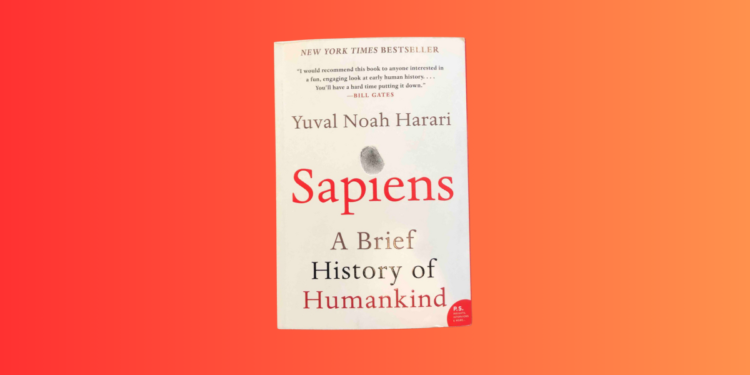Yuval Noah Harari’s book “Sapiens: A Brief History of Humankind” is a sweeping narrative that seeks to encapsulate the entire history of the Homo sapiens species, from its origins in East Africa to the present day. First published in 2011, “Sapiens” has become a global bestseller and a widely acclaimed work of popular science. In this review, we will delve into the key themes, the author’s approach, and the book’s impact on readers’ understanding of human history.
Introduction: A Grand Overview of Human History
“Sapiens” opens with the premise that Homo sapiens, or modern humans, are the only surviving members of the Homo genus due to our unique ability to cooperate flexibly in large numbers. Harari argues that this ability allowed us to dominate the planet, but it also brought about numerous challenges, including ecological destruction and social inequality. The book covers the history of our species in four main phases: the Cognitive Revolution, the Agricultural Revolution, the unification of humankind through empires and religion, and the rise of capitalism and the Scientific Revolution.
Key Themes:
- Cognitive Revolution: Harari delves into the Cognitive Revolution, which took place around 70,000 years ago and marked the emergence of modern Homo sapiens. He highlights the significance of our ability to communicate through shared myths and stories, allowing us to organize in large, flexible groups.
- Agricultural Revolution: Harari explores the shift from hunter-gatherer societies to settled agricultural communities, which led to significant changes in human lifestyles, including the emergence of hierarchies, social classes, and the domestication of plants and animals.
- Empires and Religions: The book discusses the unification of human societies under empires and shared religious beliefs, emphasizing the role of these constructs in shaping human history and conflicts.
- Capitalism and Science: Harari examines the impact of capitalism and the Scientific Revolution on human societies, leading to rapid technological progress and social change.
- Social and Political Structures: Throughout the book, Harari delves into the various social, political, and economic structures that have defined different eras in human history. He explores the transition from small, localized communities to vast empires and nation-states.
- Impact of Technology: “Sapiens” considers the profound influence of technology, particularly in the modern era, on reshaping societies, economies, and daily life.
- The Role of Myths and Narratives: Harari repeatedly emphasizes the importance of shared myths, stories, and narratives in human history, as they have been instrumental in enabling cooperation among large groups of people.
Author’s Approach:
Harari’s writing is characterized by a blend of accessible language and profound ideas. He distills complex historical and anthropological concepts into a format that is engaging and easy for the general reader to grasp. While “Sapiens” is an ambitious work, it is written in a conversational style that invites readers to ponder the grand scope of human history.
The author is unafraid to challenge commonly held beliefs and offer provocative perspectives on familiar subjects. He encourages readers to think critically about the myths and constructs that shape human society. Harari’s objective in “Sapiens” is to provide readers with a comprehensive understanding of our history and, in doing so, prompt them to contemplate the future trajectory of our species.
Impact and Significance:
“Sapiens” has had a profound impact on the world of popular science literature and the broader public understanding of human history. Some of the key reasons for its significance include:
- Accessible and Engaging: The book makes complex historical and anthropological concepts accessible to a broad audience, engaging readers in the grand narrative of human history.
- Interdisciplinary Approach: Harari’s interdisciplinary approach, drawing from history, biology, economics, and psychology, offers a holistic understanding of the human experience.
- Challenging Common Narratives: The book challenges conventional narratives and encourages readers to think critically about the myths, stories, and constructs that have shaped human society.
- International Bestseller: “Sapiens” has achieved international bestseller status, making its ideas and insights accessible to a wide range of readers worldwide.
- Sequels and Influence: The success of “Sapiens” has led to sequels, such as “Homo Deus” and “21 Lessons for the 21st Century,” further cementing Harari’s role as a prominent thinker in contemporary discussions about humanity and the future.
- Educational Impact: The book is frequently used as a teaching tool in various educational settings, helping students and educators explore the complexities of human history.
Conclusion: A Profound and Accessible Journey Through History
“Sapiens: A Brief History of Humankind” by Yuval Noah Harari offers readers a profound and accessible journey through the history of the Homo sapiens species. Harari’s ability to distill complex concepts and ideas into an engaging narrative has made the book a landmark work of popular science literature. “Sapiens” challenges conventional narratives, prompting readers to reflect on the shared myths and constructs that have defined human society throughout history. This thought-provoking and influential book continues to inspire readers to contemplate the future of our species and the enduring impact of our history on the present day.









